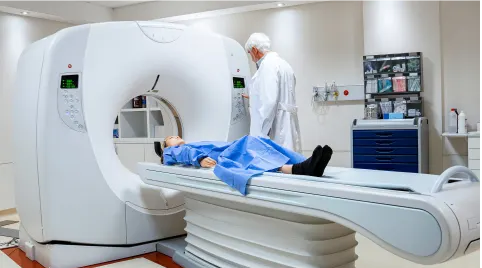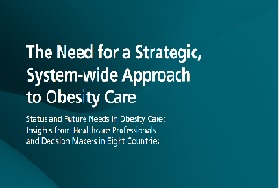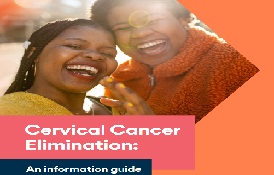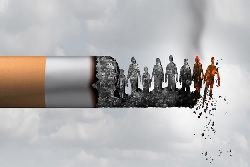
Nearly 5 million additional people are recommended to get screened for lung cancer under an updated guideline from the American Cancer Society, which expanded its recommendations to include older adults who smoke or formerly smoked — no matter how long ago they quit smoking.
Previously, the American Cancer Society recommended annual lung cancer screening for adults ages 55 to 74 with at least a 30 pack-year smoking history who either currently smoke or quit smoking less than 15 years ago. Now, the organization says how long ago you quit smoking should no longer be a factor in whether you get screened for lung cancer.
In its updated guideline, published Wednesday in the CA: A Cancer Journal for Clinicians, the American Cancer Society recommends annual lung cancer screening for current or past smokers, ages 50 to 80, with at least a 20 pack-year smoking history. A pack-year is defined as smoking an average of one pack of cigarettes per day for one year. For instance, someone who smoked two packs a day for 10 years has a 20 pack-year history, as well as someone who smoked one pack a day for 20 years.
Additionally, the American Cancer Society’s updated guideline recommends against “using any duration of years since quitting smoking” as a criterion to start or stop lung cancer screening in former smokers who meet the age and pack-year eligibility criteria.
“I think the years quit was confusing to people,” said Dr. William Dahut, chief scientific officer for the American Cancer Society.
“First of all, lung cancer is a disease of the elderly, and so, basically, your risk starts becoming greatest once you’re in your 60s, which was probably during this time period when people were stopping to be screened,” he said. “Over time, we now see that the risk continues for men and women in their 60s and above, and so that is exactly the time when you should be screening because that’s when their cancer risk is actually the highest.”
Broadening screening eligibility
The American Cancer Society estimates that its updated recommendation would lead to 21% more lung cancer deaths prevented compared with the current recommendations.
The last time the group updated its lung cancer screening guideline was in 2013.
“The main difference today is that the American Cancer Society is no longer recommending that year-since-quit factor in any eligibility for lung cancer screening,” Dr. Robert Smith, senior vice president of early cancer detection science at the American Cancer Society and lead author of the screening guideline, said in a news briefing. “So, essentially as long as an individual has a 20 or greater pack-year history and they’re between the ages of 50 and 80, and in reasonably good health, they will be eligible for screening according to our guidelines.”
The American Cancer Society isn’t the only group in the United States that issues cancer screening recommendations. The US Preventive Services Task Force, a group of independent medical experts whose recommendations help guide doctors’ decisions and influence insurance plans, has its own separate screening advice. In 2021, the USPSTF issued a final recommendation statement recommending annual screening for lung cancer in adults, ages 50 to 80, with a 20 pack-year smoking history who currently smoke or quit within the past 15 years.
“The USPSTF and other guidelines have always said that the lung cancer screening should apply for people that currently smoke and for people who have quit smoking within the last 15 years,” said Dr. Matthew Triplette, a pulmonologist, associate professor, and cancer prevention researcher at the Fred Hutchinson Cancer Center in Seattle, who was not involved in either the ACS or USPSTF recommendations.
“The new guidelines from the American Cancer Society, I think, are reflective of newer modeling evidence,” Triplette said. “In that, they are saying risk does not stop when you quit smoking for 15 years and that people who have had that heavy smoking history actually should continue to get screened or should be eligible for screening.”
He added that it’s estimated only about 10% to 15% of all eligible people in the United States have been screened for lung cancer.
The American Cancer Society’s updated screening guideline presents an opportunity to raise awareness around screening for lung cancer, Triplette said, and to encourage those who are eligible for screening to do so — especially those in Black and Brown communities who are at an increased risk for developing and dying from lung cancer.
“We see a lot of health disparities in lung cancer, particularly by race. So, we see younger people with less smoking history of Black race at higher risk for lung cancer than other racial groups,” Triplette said. “I think expanding the criteria represents an opportunity to reach more people, but if we don’t tailor the screening guidelines and improve the screening process to make sure people are aware of it — and that they’re able to get access to it — then any guideline changes aren’t going to really improve uptake.”
Prepared by: Shafikah binti Rahim (Nursing Officer)
Sources:
https://edition.cnn.com/2023/11/01/health/lung-cancer-new-guideline-american-cancer-society/
Tarikh Input: 17/11/2023 | Kemaskini: 17/11/2023 | aimerul
PERKONGSIAN MEDIA



























